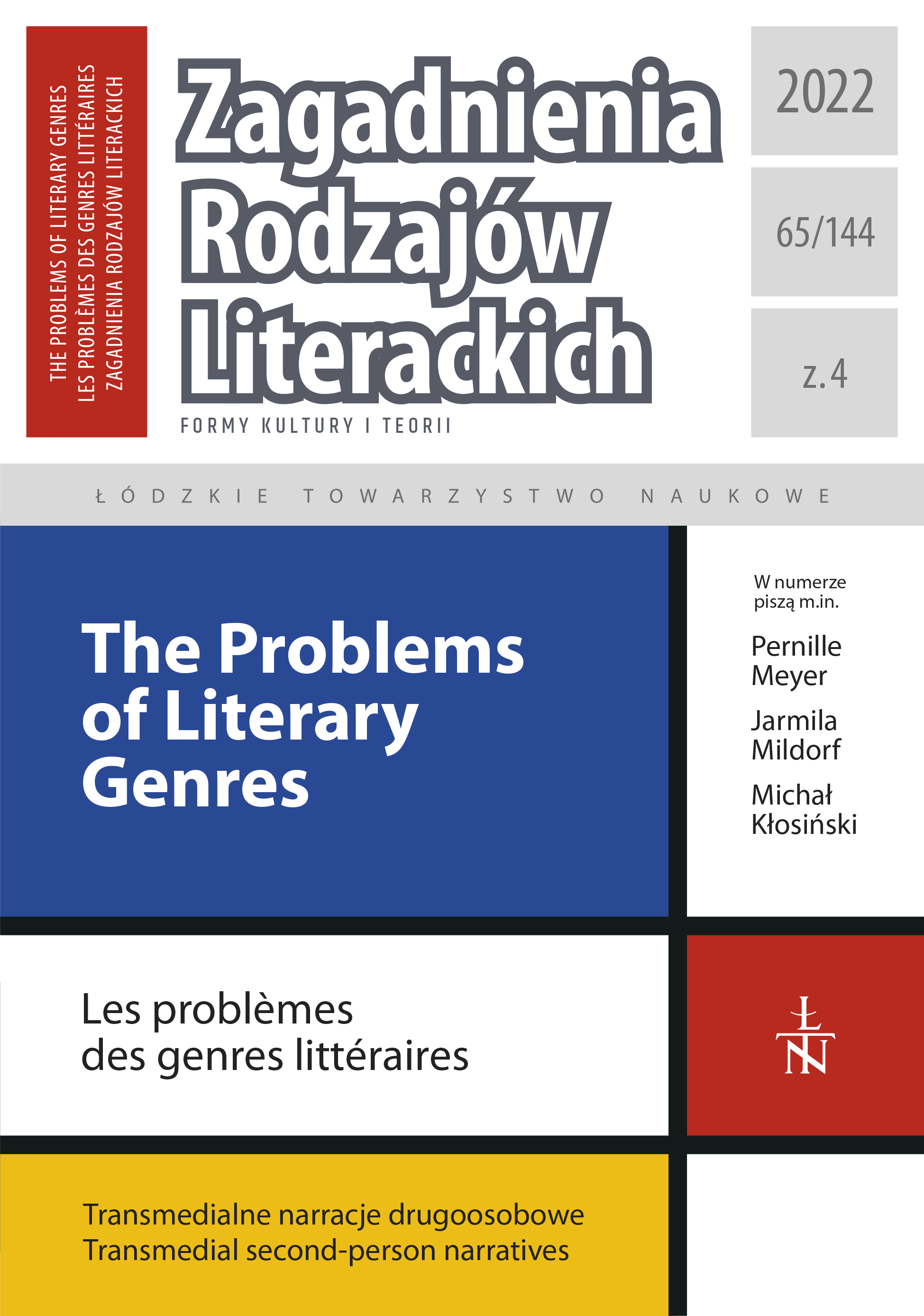Your Choice and Negative Affect in Alejandro Zambra’s “Multiple Choice” (2014) and Carmen Maria Machado’s "In the Dream House” (2019)
DOI:
https://doi.org/10.26485/ZRL/2022/65.4/3Słowa kluczowe:
second-person narration, hypertext fiction, shame, choice, Alejandro Zambra, Carmen Maria MachadoAbstrakt
This essay builds upon David Herman’s idea of double deixis to explore the ‘choose-your-own-adventure’ (CYOA) form as a popular subtype of you-narration that foregrounds reader involvement, co-creation, and agency. The central conceit from such instances of hypertext fiction to self-help writing seems to be that you — the reader/consumer — have a choice. However, in my reading of Alejandro Zambra’s Multiple Choice (2014) and Carmen Maria Machado’s In the Dream House (2019), the false equivalence between choice and non-choice becomes particularly palpable when considering the affect of the second-person mode. While the former exemplifies what Irene Kacandes has called ‘proto-’ or ‘paper hypertext’ (2001: 200), the latter is also a memoir. I look at the underexamined intersection of hypertext fiction and autobiographical writing in the history of second-person narratives to restore the significance of negative affect to critical discussion. The agency to choose in you-narratives not only involves the anticipation of guilt, fault and/or shame, but autodiegetic instances of you-narration like Machado’s memoir formalise Jean-Paul Sartre’s phenomenological description of shame and Denise Riley’s concept of malignant inner speech, or malediction.
Liczba pobrań
Bibliografia
Abbott H. Porter (2010), The Cambridge Introduction to Narrative, Cambridge University Press, Cambridge.
Abramovich Paulina (2019), “Where are they?”: families search for Chile’s disappeared prisoners, “The Guardian”, August 14, www.theguardian.com/world/2019/aug/14/where-are-they-families-search-for-chile-disappeared-prisoners [access: 19.08.2022].
Bell Alice (2021), “It all feels too real”: Digital Storyworlds and “Ontological Resonance”, “Style” vol. 55.
Barthes Roland (2002), A Lover’s Discourse: Fragments, trans. H. Richard, Vintage Classics, London.
Benjamin Jessica (1988), The Bonds of Love: Psychoanalysis, Feminism, and the Problem of Do¬mination, Pantheon, New York.
Boully Jenny (2007), The Body: An Essay, Essay Press, New York.
Dannenberg Hilary P. (2008), Coincidence and Counterfactuality: Plotting Time and Space in Narrative Fiction, University of Nebraska Press, Lincoln.
East Ben (2016), Alejandro Zambra’s latest novel explores life under the dictatorship of Augusto Pi¬nochet, “The National” vol. 8, November 2016, www.thenationalnews.com/arts/alejandro¬-zambra-s-latest-novel-explores-life-under-the-dictatorship-of-augusto-pinochet-1.179452 [access: 17.08.2022].
Ensslin Astrid, Bell Alice (2021), Digital Fiction and the Unnatural: Transmedial Narrative Theory, Method, and Analysis, Ohio State University Press, Columbus.
Flood Alison (2020), Literary puzzle solved for just third time in almost 100 years, “The Guardian” vol. 10, November 2020, www.theguardian.com/books/2020/nov/10/literary-puzzle-sol¬ved-for-just-third-time-in-almost-100-years-cains-jawbone?CMP=Share_iOSApp_Other [access: 9.04.2022].
Fludernik Monika (1993), Second Person Fiction: Narrative You As Addressee And/Or Protago¬nist, “AAA — Arbeiten aus Anglistik und Amerikanistik” vol. 18.
Genette Gérard (1980), Narrative Discourse: An Essay in Method, trans. J.E. Lewin, Cornell University Press, Ithaca, New York.
Genette Gérard (1990), Narrative Discourse Revisited, trans. J.E. Lewin, Cornell University Press, Ithaca, New York.
Genette Gérard (1997), Palimpsests: Literature in the Second Degree, trans. Ch. Newman, C. Doubinsky, University of Nebraska Press, Lincoln.
Herman David (2004), Story Logic: Problems and Possibilities of Narrative, University of Nebra¬ska Press, Lincoln.
Herman David, Manfred Jahn, Ryan Marie-Laure, eds. (2005), Routledge Encyclopedia of Nar¬rative Theory, Routledge, London.
Iliopoulou Evegenia (2019), Because of You: Understanding Second-Person Storytelling, trans¬cript Verlag, Bielefeld.
Kacandes Irene (1994), Narrative Apostrophe: Reading, Rhetoric, Resistance in Michel Butor’s La modification and Julio Cortázar’s “Graffiti”, “Style” vol. 28.
Kacandes Irene (2001), Talk Fiction: Literature and the Talk Explosion, University of Nebraska Press, Lincoln.
Lejeune Philippe (1980), Je est un autre: L’autobiographie, de la littérature aux médias, Éditions du Seuil, Paris.
Lejeune Phillippe (1989), On Autobiography, ed. P.J. Eakin, trans. K. Leary, University of Min¬nesota Press, Minneapolis.
Lévinas Emmanuel (2003), On Escape, De l’évasion, trans. B. Bergo, Stanford University Press, Stanford.
Machado Carmen Maria (2020), In the Dream House, Serpent’s Tail, London.
Burbach Roger (2003), The Pinochet Affair: State Terrorism and Global Justice, Zed Books, London.
Power Chris (2016), Multiple Choice Review — Choose Your Own Chilean Misadventure, “The Guardian”, October 5, www.theguardian.com/books/2016/oct/05/multiple-choice-by-ale¬jandro-zambra-review [access: 30.03.2022].
Riley Denise (1988), ‘Am I That Name?’: Feminism and the Category of ‘Women’ in History, The Macmillan Press, London.
Riley Denise (2005), Impersonal Passion: Language as Affect, Duke University Press, Durham.
Rothenberg Jerome, Robinson Jeffrey C., eds. (2009), Poems for the Millennium: Volume Three, University of California Press, Berkeley, Los Angeles.
Sartre Jean-Paul (2003), Being and Nothingness: An Essay on Phenomenological Ontology, trans. H.E. Barnes, Routledge, London.
Sorlin Sandrine (2022), The Stylistics of ‘You’: Second-Person Pronoun and its Pragmatic Effects, Cambridge University Press, Cambridge.
Thompson Stith (1955–1958), Motif-Index of Folk Literature: A Classification of Narrative Ele¬ments in Folktales, Ballads, Myths, Fables, Mediaeval Romances, Exempla, Fabliaux, Jest-Bo¬oks, and Local Legends, Indiana University Press, Bloomington.
Wong Denise (2021), Gazing beyond the fourth wall: shame and second-person narration, “Textu¬al Practice” vol. 36(10), DOI: 10.1080/0950236X.2021.1971751.
Zambra Alejandro (2017), Multiple Choice, trans. M. McDowell, Granta, London.








